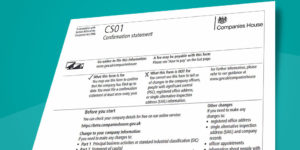How to set up a company in the UK
You’ve come up with a fantastic business idea and produced a rock-solid business plan… but what is the next step to starting a business? The vast majority of aspiring entrepreneurs choose to incorporate a limited company at this stage. To help you get to grips with this, here we explain how to set up a company in the UK, including how to choose a great company name, and the reporting obligations you need to fulfil after setting up a limited company.
The process is quick, simple, and offers both you and your business a whole lot of benefits and protections. By the end of this comprehensive guide, you should have a solid understanding of the basics of company formation and whether it’s right for your business.
What is company formation?
Simply put, company formation is the process of registering your business as a limited company through Companies House – the UK Government’s official registrar of companies. It’s the only body in the UK permitted to officially incorporate a company.
So, what does it mean to incorporate a company? By incorporating a company, you transform your business into its own legal entity. That means your company is essentially an individual person in the eyes of the law. This is important because it will offer you some much-needed protection in the event of your business being unsuccessful.
By incorporating a limited company, you will drive a legal wedge between you and your company in terms of shared finances, liabilities, contractual agreements and ownership of any property or assets.
As a company owner, you’ll only be liable up to the nominal value of the shares you issue in your company. Any amount of personal money you own beyond the value of those shares will be protected. This protection is referred to as ‘limited liability.’
The vast majority of private companies are limited by shares, which are set up for the purpose of generating a profit for it’s shareholders, so that’s the type of company we’re focussing on here.
- Our All Inclusive Package - the perfect way to set up a company
- How to start a business in the UK
- What is company formation?
Strictly speaking, you do not have to incorporate a company. It’s not a legal requirement in the UK. But if you choose to do business as an unregistered entity or sole trader, there will be no legal separation between you and your business. So, if something goes wrong, your personal finances or assets could be at risk.
That’s why a huge number of business owners decide to go down the route of limited company formation.
How do I form a company?
If you’d like to turn your new business into a company, you’ll be relieved to know the company formation process is quick and simple using a company formation agent such as 1st Formations.
Here’s what you need to form a limited company:
Unique company name
This is the fun part – although there are a few rules about the types of names you can use. We’ll get to that in a minute.
Registered office address
This can be anywhere in your chosen jurisdiction (England and Wales, Scotland or Northern Ireland), but it must be a real address – not a PO Box. If you’d like to keep your address private, 1st Formations offer a registered office address service so that your personal address stays off the public register at Companies House.
Company director
This is the person responsible for managing your company. You must have at least one; however, you can have several if you’d like.
Shareholder
This is the owner of your company, and it can be the same person as your company director. That means you only need one person to incorporate a company, although you can have more than one shareholder if you so desire.
Memorandum and articles of association
The memorandum and articles of association are the founding documents of your company. However, there is no need to worry about obtaining these documents: Companies House will generate the memorandum as part of the company registration process, and attach it to the articles – which your company formation agent will provide as part of their service
Share capital of at least one issued share
You must issue at least one share. The online company order form will make this easy for you to do.
There is no limit to the number of shares you issue; however, the more you issue, the greater your liability will be, should your business fall into financial difficulties.
We recommend you issue between 10 and 100 shares of a nominal value of £1.00.
Standard Industrial Classification (SIC) code
This is a code the government uses to identify your business based on the type of industry you’re operating in. You can use up to four SIC codes to describe your business’ activity or activities.
Again, the formation agent’s company order form will make this easy for you and supply a comprehensive list of SIC codes to choose from.
Ordering your new company online
If you’d like a hand getting started, 1st Formations offer a wide range of company formation packages tailored to suit most business needs.
We also provide an ‘order by telephone service’ if you are not confident in forming a company online on your own. Call 020 3897 2233 to order your company by telephone.
Our simple online process means that you can choose your company name, formation package, make a card payment, and complete your company details in just 10 to 15 minutes.
Once you have finished completing your order, we’ll then check over your application and send it off to Companies House. It will typically take up to 24 hours for your application to be approved; however, this will depend upon Companies House workload on the day, and sometimes it can take longer.
As soon as your company’s been incorporated, we’ll send your company documents, VAT invoice and WebFiling Authentication Code to you by email. You will then be ready to start trading. It’s really that simple!
How do I come up with a brilliant company name?
One of the fun tasks of setting up a new business is coming up with a completely brilliant name for your company. However, be warned, it can also be the most difficult part!
So, how do you come up with a great company name?
The nature of your business
The best place to start is to consider the nature of your business. Try to come up with words or phrases that describe you, your business idea, or the products and services you’re planning to sell.
Don’t be afraid to get personal or cautiously explore puns. But if you’re really stuck, there are plenty of ways to get the creative juices flowing.
For example, you could transform a long or clunky phrase into an acronym, or mash-up two or three words to form a new and clever way to label your business. You could also look to mythology or fiction for inspiration, as well as foreign words or a dead language like Latin.
- Does a company name need to include Limited or Ltd?
- Guidelines for creating a limited company name
- How to protect a business name
Coming up with a name idea might be difficult, and you may need to ask for help from friends and family. It could also take quite a while. But once you’ve found the right name for your business, you’ll know it.
The name you choose will be legally tied to your business and the government has a few rules you’ll need to adhere to when you register a new company name. So, what are the rules?
Something unique
First and foremost, your company name must be unique. It cannot be the same as or too like the name of an existing company. For example, if your company is identical to another company’s name apart from a special character or certain punctuation, your application may be rejected.
If you’d like to make sure another company hasn’t already reserved your name, you can check instantly by using 1st Formations’ company name search tool on our website’s homepage.
Company name rules
Company name rules and regulations prohibit the use of offensive words, and you’ve also got to be careful about using what are known as ‘sensitive words.’ For example, you cannot use words that suggest a connection to the UK Government, any devolved government, administration or public authority.
Companies House will normally make a decision on sensitive word usage on a case-by-case basis. If you try to use words like ‘royal’ or ‘trust’ without first seeking permission, your application will most likely be rejected.
Just like Twitter, Companies House also imposes a character count on how long your company name can be. When incorporating a company in the UK, you’ll be limited to 160 characters.
Also, if it’s a limited company, your name must end with either the word “Limited” or its abbreviation ‘Ltd.’
Trading name
If you’re now panicking about having to stick the word “Limited” in neon lights above your new shop, don’t fret.
Although the exact registered name of your company needs to be displayed and used when you carry out any type of trading activity, a lot of companies adopt a ‘trading name.’
Your trading name can be a bit snappier, so it’s normally easier to market and stick up in bright lights.
If you choose to operate under a trading name, you’re perfectly within your rights to do so. That being said, you will need to clearly state on company stationery, emails and website – what your trading name is, and what your registered name is. For example at the foot of your website or letterheads, you may wish to say something like: ‘ABC Media’ is a trading name of ‘ABC Media Services Limited.’
How do I handle company reporting?
Owning a start-up can be a whole lot of fun. But it also means you’ll be responsible for some reporting. If you choose to incorporate your new business as a limited company, you will be expected to accurately report all of your business income, expenditures, liabilities and assets. You will also be required to file an annual confirmation statement.
Accurate records
First, you must keep accurate data on the money your company receives and spends.
You need to keep information on the assets your business owns, any debts it owes, or any debts owed to your company by other people or businesses. You should also keep an inventory of the stock your business owns at the end of its financial year, along with the stock-takings used to work out that inventory.
You should also record the goods your company buys and sells, who those goods are from and who they’ve been sold to. If you’re selling products in the retail market, you’re normally exempt from reporting the latter.
It is necessary to maintain these records at a named place in which officials will be able to access them if needed. Also, you must hold on to your business records for a minimum of six years from the relevant accounting period.
Annual accounts
This information will then be used to prepare your company’s statutory annual accounts, file your company tax returns and pay Corporation Tax (and VAT, if applicable). These are all regular accounting responsibilities you’ll be expected to fulfil as part of running your company.
You can read more about company tax returns and corporation tax here.
The big one is your company’s statutory accounts. These are due every year – whether your company is trading or not. You’ll be expected to file them with Companies House within nine months of your accounting reference date. This is normally the anniversary of the last calendar day of the month in which you incorporated your company.
Confirmation Statement
The confirmation statement is an annual filing requirement that replaced the annual return in 2016. Its purpose is to verify that company information displayed at Companies House is accurate and up to date.
To complete a confirmation statement, companies must check that the information registered at Companies House (and shown on the companies register) is correct and up to date. The details you need to check and confirm include the registered office address, SIC codes, shareholders, people with significant control, directors and secretaries, and share capital.
The statement can be filed online via a company formation agent such as 1st Formations, or using Companies House WebFiling service. It can even be filed by post using paper form CS01.
The bottom line
At first glance, this seems like a lot to take in.
By forming a company, you’re taking a big step towards transforming your business idea into a very real, thriving enterprise. To do that, you’ll admittedly need to take on a few legal responsibilities. But once you get the hang of it, your reporting requirements and legal obligations as a limited company owner are actually pretty straightforward.
At the end of the day, forming a limited by shares company will offer both you and your business some much-needed protection. You will worry less about finances and more about getting out there and making your new business work.
If you have any questions, please leave them in the comments section below.









Join The Discussion
Comments (4)
Hello, I hope this email finds you well.
I’d like to inquiry about incorporating an Ltd. in the UK. This entity will be owned 100% by an already existing B.V. in the Netherlands.
Some of my questions are the following:
– do you take care of the PO Box/provide an address?
– do I need to own a UK-based phone number?
– do you help with setting up a bank account?
– for the signing of all paperwork, etc. regarding this entity, must it be a person (an individual) or can it be a company (a business)?
– how long does the process take and what is the pricing?
– what do you need from us? (e.g. which materials you need me to give you, etc.)
Thank you very much.
I look forward to hearing from you soon.
Best regards,
Ruperto Calatrava
Thank you for your kind enquiry, Ruperto. You have come to the right place!
In answer to your questions:
1. We do provide a full range of address services to enable you to register a company in the UK despite the entity being owned by a Netherlands company, and so you can receive all of your government and non-government mail delivered to our address in a prestigious area of Central London
2. It is not a requirement for a UK limited company to have its own UK-based phone number, and we do not require this either.
3. We can assist with helping set up a UK bank account.
4. The company will need to have at least one human director. The directors are responsible for signing the legal paperwork once the company is formed. Before the company is formed, this can be done by the customer.
5. The process takes up to 10 minutes to complete a short company details application form, and then 3 to 6 working hours thereafter for the company to be incorporated. You can find out more information about package prices here: https://www.1stformations.co.uk/compare-packages/
6. If the owners are residents of the Netherlands, we will need to certify their ID via an App we will provide, and we will also require proof of address.
We would recommend contacting our live chat team at https://www.1stformations.co.uk, or calling us on +44 20 3897 2233, and we will be able to assist further.
We trust this information is of use to you.
Kind regards,
The 1st Formations Team
Good morning from Malysia.
I have one query and one suggedtion,
How do I change the home addres of a director and id there a charge got this?
Would you consider creating a first year diary for a company showing all the actions that should/need to be taken. This will help is keep on track as a company gets through its first and lilely most difficult phase.
Many thanks
Bob Williamson
Hi Robert.
Thank you for your message. Please accept my apologies for the delay in my response.
Referring specifically to the address registered at Companies House, you would need to file the form CH01 to update the home address of the director in question. Companies House do not charge a filing fee for submitting this form. If you would like assistance with this we can undertake the filing for £19.99 plus VAT. Please call us on 020 3984 5387 or email us at [email protected].
In terms of your suggestion re- a first year diary for new companies, I think this is an excellent idea and one we will fully consider. Thank you for your kind suggestion.
Best regards,
The 1st Formations Team